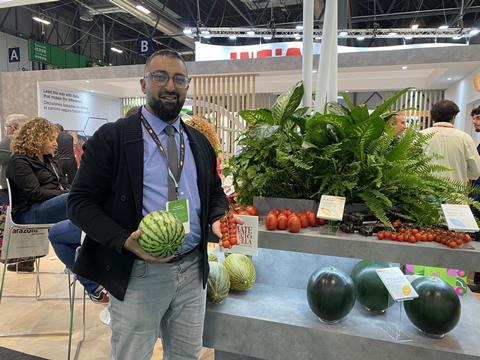New varieties include wide-ranging ToBRFV-resistant tomatoes and melons and watermelons that deliver on both flavour and yield

BASF Nunhems has launched a number of new tomato, melon and watermelon varieties in a bid to help growers manage disease pressure and deliver great taste for consumers.
The breeder showcased its varietal portfolio in early October at Fruit Attraction, where its main focus was on ToBRFV-resistant tomatoes and melons offering high yield without compromising on flavour.
BASF’s current focus, according to value chain and customer marketing specialist Nasir Ahmed, is on simplifying its tomato assortment and encouraging growers to use fewer varieties per tomato type to drive greater consistency.
Recent launches in the tomato category include the cluster vine variety Beires and loose variety Palmeo, both high-yielding and aimed at mid to high-tech producers.
Beires complements the existing Cabosur cluster variety and is suitable for organic production and early transplanting.
Meanwhile, Palmeo is an especially large variety, delivering GG-GGG sizes, and was made available for commercial production last season.
It is resistant to both ToBRFV and Fulvia, more commonly known as tomato leaf mould. The latter is a fungal disease that causes lesions on the leaves, premature defoliation, and yield reduction in tomatoes.
The priority with all these new varieties, according to product development specialist Juan Miguel Agüero, is to allow growers to produce in the same way they did before ToBRFV became widespread.
In addition, BASF has reinforced its range of plum tomatoes with the large Azovian saladette variety, which has intermediate resistance to ToBRFV.
This will be followed by new cultivars in different sizes, as well as the seed company’s Intense range, which features varieties for foodservice and retail with a trait for more flesh and less leakage.
Two as-yet-unnamed varieties in this segment are NUN 09399 TOF (for export) and NUN 06226 TOF (for processing), which are suitable for production in Spain and Morocco.
Meanwhile, in cherry vine tomatoes BASF has added Purion, for medium- and high-tech farms, to Vitalion and Marvelion.
Daivion is the breeder’s key variety in round cherry tomatoes, and there is also a focus on developing the cherry plum segment for mid-tech and high-tech production.
Furthermore, BASF expects to launch two new tomato rootstocks this season to complement Dreampower and Maaspower. These are BASF’s first ToBRFV-resistant rootstocks, and they can be paired with any of its resistant tomato varieties.
Melons and watermelons
In melons, Kicaya (also known as TropiGalkia) is a new addition to the breeder’s high-flavour Galkia range from Brazil and will be available from European retailers this winter.
Grown in Spain and Brazil, Galkia types within the Galia segment have a harvest indicator, are high in Brix, and will be available all year round.
In watermelons, Takemi, which was first commercialised last year, is a versatile mini variety that can be used both in monoculture programmes and as a pollinator. Takemi is a mini watermelon weighing around 2kg with black skin, small seeds, and great internal quality.
Another watermelon to watch out for is Ayami, which is ideal for a single consumer. Grown in Brazil, it will be on European retail shelves this winter.
Other recent releases include the piel de sapo variety Izalco, which is ranges from 3kg to 4kg and is therefore ideal for the Spanish market. BASF describes the variety as “rustic” and adaptable to different production areas, featuring various resistances and perfectly suited to April transplanting in Murcia.
Global crop manager Diego Maestre said BASF is looking to strengthen the melon and watermelon industry through innovation, sustainability and shared growth.
The breeder’s so-called ‘melonution’ is based on the four pillars: production and quality, (combining agronomic needs with organoleptic quality), trust (through ranges like Galkia and Fashion), innovation (for example its white-fleshed Dino melons), and versatility (by developing varieties suitable for both fresh consumption and processing).
On this last point, BASF has developed two dual-purpose watermelon varieties called Bazman and Harmonium, both of which are well suited to the fresh market as well as minimal processing.
“It’s a really busy time at BASF Nunhems and we’re working around the clock to deliver on taste and shelf life, which is what the consumers are demanding,” said Ahmed. “BASF Nunhems continues to breed new varieties across a range of vegetable and fruit crops, catering for local market needs.”
Biological controls
Alongside its varietal offering, BASF is launching a new range of biological controls, among them Serifel, Velifer and Essenciel. Serifel is a broad-spectrum fungicide, while Velifer is an insecticide, and Essenciel is a combined fungicide, insecticide and acaricide (meaning it also controls mites and ticks).
Arturo Sanz, crop manager for vegetables at BASF, said: “Our range of products helps farmers to reduce waste products and manage resistances, improve the stress tolerance of their crops and protect them from pests and diseases for longer periods, providing greater flexibility in harvesting dates…
“We have new solutions ready to be introduced into our portfolio, enabling us to focus on significant pests for greenhouse crops.”



